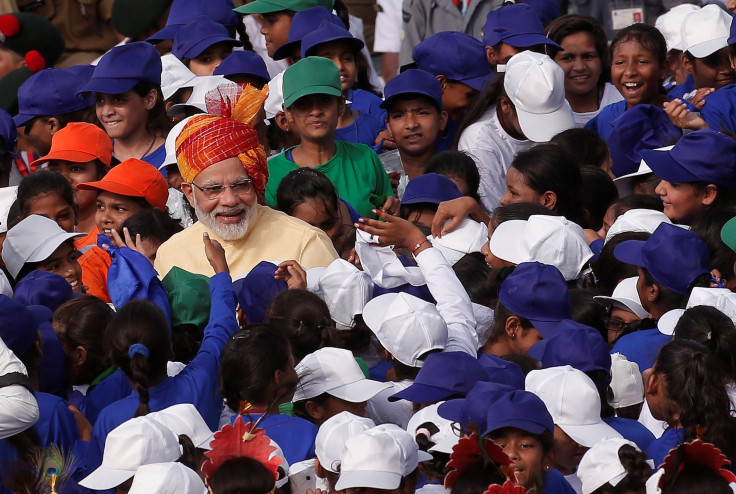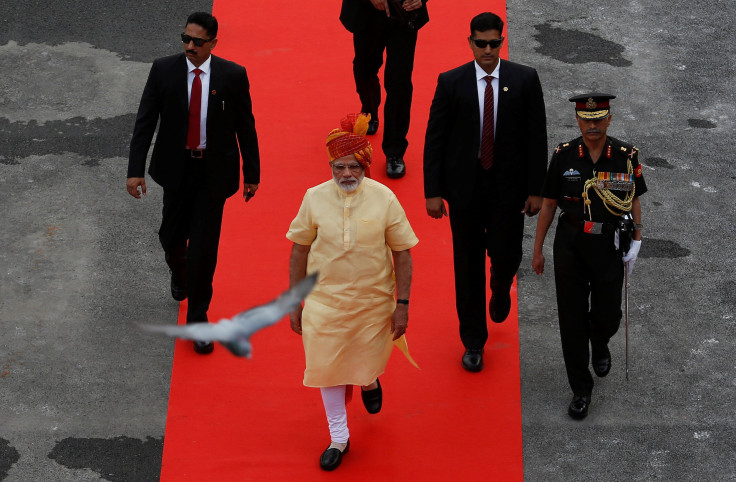Narendra Modi's Bharatiya Janata Party Leading Gujarat Election Results In India

India's ruling Bharatiya Janata Party was on its way to winning the crucial legislature election in Prime Minister Narendra Modi’s home state of Gujarat on Sunday, local media reports said. The right-wing nationalist party ruled the state before the election.
Earlier results showing opposition Congress party surging ahead of the incumbent BJP led to a slump in the stock market during early trade Monday. However, it recovered as the BJP regained its lead — an indication of how important the election was being considered economically.
The Bombay Stock Exchange (BSE) Sensex nosedived over 850 points as early leads indicated a close fight between BJP and Congress in Gujarat. After falling to the day’s low of 32,595, it was back in positive territory as the BJP pulled ahead of the Congress later in the day.
As of writing this, leads were in for all of Gujarat's 182 seats and the BJP was leading in over 100, NDTV reported. If current trends continue, the party would win more than the required 92 seats to form the government in the state.
However, the win would come with the bitter pill of winning fewer seats than the 115 it captured in the 2012 state election, and will be a cause of concern for some of the party’s leaders who had predicted a much larger victory.
Politically, the election was being touted as a test run for the national election in 2019, and a referendum on Modi’s policies more than half-way through his first term in office.

The run-up to the election saw the opposition Congress picking holes in the model of development in Gujarat — something which the prime minister has said he wants to emulate in the rest of the country — and the various economic policies that the central government had issued, especially demonetization and the rollout of the goods and services tax.
Driven on the back foot, the BJP dropped its development rhetoric — that had been instrumental in its capturing power at the center — from its campaign and resorted to its Hindu nationalist campaign, especially targeting Muslim minorities. A low point was witnessed when Modi accused former Prime Minister Manmohan Singh of conspiring with elements in neighboring Pakistan to influence the outcome of the results in the state, something similar to the alleged Russian interference in the 2016 presidential election in the United States.
The close finish in Gujarat is a far cry from the BJP from the stellar performance it showed earlier this year in the state election in Uttar Pradesh (where it won a massive two-thirds majority), and would likely give pause to the BJP leadership and maybe trigger a rethink on the course it wants to follow ahead of the 2019 national election.
Ever since the BJP assumed power in New Delhi with Modi’s majority win in 2014 national election, it has pursued a majoritarian discourse, with the final agenda of a Hindu nation, an idea not very dear to the minority communities in the country. This idea received a boost with its big win in Uttar Pradesh, where it installed a Hindu monk as the state's chief minister.
However, it seemed to have hit a hurdle in Gujarat, where the close finish indicates that people may have not whole-heartedly bought the majoritarian discourse that the BJP tried to peddle as its last recourse.
© Copyright IBTimes 2025. All rights reserved.





















